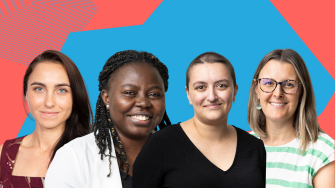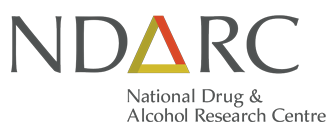
NDARC Media
International Women’s Day (IWD) is observed every year on March 8th to honour and celebrate the accomplishments of women while advocating for gender equality worldwide. NDARC at UNSW Sydney is celebrating IWD by highlighting exceptional women in research. Dr Chrianna Bharat, Dr Winifred Asare-Doku, Dr Ria Hopkins, and Associate Professor Alys Havard are four inspiring researchers at NDARC with diverse areas of expertise showcasing dedication, resilience, and innovation in their academic pursuits.
Could you describe your research program and what motivated you to pursue this field?
Chrianna: My focus is on improving the evidence surrounding the epidemiology and treatment of substance use disorders. I am interested in developing new methods to evaluate the efficacy and safety of medication.
I started my career as a statistical consultant in medical and public health. Later, as a biostatistical expert, I joined the Substance Use Disorder Working Group of the WHO World Mental Health Survey Initiative – the most extensive cross-national epidemiological study ever conducted. This shaped my PhD and postdoctoral studies, where I developed knowledge of substance use disorder literature and applied my skills to address critical health questions. My desire to produce quality evidence to improve population health has driven my career.
Winifred: I conduct research on mental health, alcohol, and drug use among disadvantaged populations. Additionally, I am a co-leader of a program to reduce drug-related harm in diverse communities.
My interest in this field stems from my experience as a clinical psychologist working with clients with comorbid alcohol and other drug and mental disorders. My training as a clinical psychologist was based on the Boulder Model, also called the scientist–practitioner model, which provided me with a foundation in research and scientific practice. My primary goal is to reduce the harm associated with these issues and explore the intersection of drug use, mental health, and suicide.
Ria: My study area is pharmacoepidemiology, where I explore the use and outcomes of medicines associated with harm in populations. This includes investigating the use of pharmaceutical opioids.
I’ve always been interested in health care. Initially, I thought I wanted to be a clinician, but during my studies, I realised I was much more interested in health at the population level rather than the one-on-one level. Compared to epidemiology, pharmacoepidemiology is still relatively young, so it’s exciting to work in, particularly if you’re interested in new methods and study designs. It’s also gratifying because of the potential to have real impacts on people’s health.
Alys: My research aims to identify the safety and effectiveness of pharmaceutical treatments for substance dependence in priority populations, including pregnant women.
The urgent need for evidence combined with the problem-solving approach to generating the needed evidence drew me to this particular research area. As pregnant women are usually excluded from scientific experiments, there is very little information available to guide decisions about which medicines are safe and effective to use during pregnancy. As obtaining this evidence through experimental research is impossible, we have to devise other creative ways to determine the effects of medicines when used during pregnancy. Our approach is to conduct observational studies using data routinely collected through contacts with the health system – doing this in a way that produces valid and trustworthy evidence involves a lot of critical thinking and careful planning, which keeps my day-to-day work very interesting.
Who are some women who have been influential or served as role models for you in your career? How did they assist you?
Chrianna: In my career, I have had the privilege of working with several female-dominated research groups. These women have acted as my role models and provided me with diverse guidance on time management, prioritisation, career planning, finding balance, managing the emotional toll of academia, and developing social management and leadership skills. This personalised guidance from my mentors, such as Professor Louisa Degenhardt, has been invaluable.
Winifred: Some remarkable women have made significant contributions to my career. They include my mum, Helena Hammond, who has shown resilience, perseverance, and determination in her endeavours and, through her own experiences, encouraged me to pursue my dreams. The late Dr Araba Sefa-Dedeh, my clinical supervisor, provided valuable clinical insights, expertise, and constructive feedback to refine my clinical skills. Professor Carole James and Dr Jane Rich (my PhD supervisors), who strive for academic excellence, demonstrated strong collaboration with the industry, guiding me to develop the same during my PhD and beyond.
Ria: I have been lucky enough to work with some fantastic women, including Associate Professor Natasa Gisev, my primary PhD supervisor, Professor Louisa Degenhardt and Associate Professor Alys Havard. Women such as Professors Sallie Anne Pearson and Nicole Pratt, who drive pharmacoepidemiology forward as a field in Australia and internationally, have inspired me. Interestingly, pharmacoepidemiology in Australia bucks the general trends elsewhere in the world and in academia in that many of the major research programs are led by women, so I consider myself incredibly lucky to have so many amazing women at the early, mid, and senior career levels to look up to and to learn from.
Alys: I’ve been lucky to benefit from longstanding relationships with a couple of women in senior academic and leadership positions. These women have set strong examples and provided inspiration for the type of academic, leader, colleague and person I would like to be. They have also helped me to progress in my career by giving honest feedback and advice, providing practical opportunities, facilitating connections, etc.
Could you share an academic challenge you faced and how you overcame it?
Chrianna: In the early stages of my Ph.D., I realized I tended to keep ideas/papers/work to myself longer than needed, in fear that sharing them with colleagues prematurely or incompletely would reflect negatively on me. It became apparent that doing so slows the progress of the projects and restricts colleagues from providing timely, constructive input. I now set self-imposed deadlines for when to circulate documentation to ensure I don’t let perfect be the enemy of good.
Winifred: Securing grant funding for research projects can be highly competitive and challenging, particularly for early-career researchers, due to limited funding opportunities and experience. To address this challenge, I have been seeking collaboration with other early and mid-career researchers to build my research network and give me a competitive advantage. I have also sought seed funding to conduct pilot projects to generate preliminary data and proof-of-concept studies to strengthen future grant applications.
Ria: This may be more personal than an academic challenge, but I have always struggled with imposter syndrome. It has been a long (and still ongoing) process of learning to assert myself and not be afraid to take up space. I have been lucky enough to have some powerful women to emulate and remind me that I know enough and deserve to be in the room.
Alys: I can think of many challenges during my academic career, including unsuccessful grant applications, being overlooked for promotion, and barriers to progress in research studies. In all cases, sharing the burden with my colleagues has gotten me through and kept me believing it will all work out in the end.
What are two to three highlights of your career so far? What are you most proud of?
Chrianna: My most recent career highlights relate to my PhD graduation ceremony (nothing compares to seeing your family beaming at you from the crowd) and a recently published systematic review. Both highlights were years in the making, with moments where I thought finishing was impossible. In both instances, I’m most proud of the perseverance demonstrated—just one step at a time.
Winifred: Some career highlights include my role as ECR co-chair and collaborative partnerships with other researchers, institutions, and industry partners. However, I’m most proud of leading the $1.6 million Kava Evaluation Pilot project funded by the Department of Health and Aged Care. The evaluation is now completed, and the report is published. The result of this project has a significant policy impact in determining the change in the amount of kava imported into Australia.
Ria: Completing my PhD and gaining my first Postdoctoral role were monumental achievements of which I am incredibly proud. Obtaining my first seed funding grant as CI reinforced that what I do matters, is worth doing and that I can do it.
Alys: I am delighted that the evidence generated through my research has fed into guidelines and resources used by healthcare providers and pregnant women when making decisions about medicine use during pregnancy. In this way, I’ve been able to contribute to improving health outcomes for pregnant women and their babies. I am also extremely proud of the achievements of the research students and early career researchers in my team – it is very satisfying to see these team members develop their independence and publish high-quality research, win grants, and, mostly importantly, produce research that improves health and other aspects of life.
Lastly, do you have any message for young women considering a career in this field?
Chrianna: Collaborate with people as excited about the research as you are.
Winifred: Embarking on a research career in mental health and alcohol and other drug space is a noble and impactful journey. You will make a profound difference in the lives of individuals and communities by addressing the complexities of these disorders. Your contributions have the potential to shape the future of health care, inform evidence-based interventions, and improve outcomes both locally and globally.
Ria: Australia is a great place to work in pharmacoepidemiology for many reasons, including the number of strong female leaders in the field. I have found it to be a welcoming and supportive area to work in, and I encourage anyone interested in health outcomes, big data, or methods to check it out.
Alys: High-quality and impactful research is a team endeavour, and it can be extremely fulfilling if you enjoy working with your collaborators. Invest time in finding people you enjoy working with.








